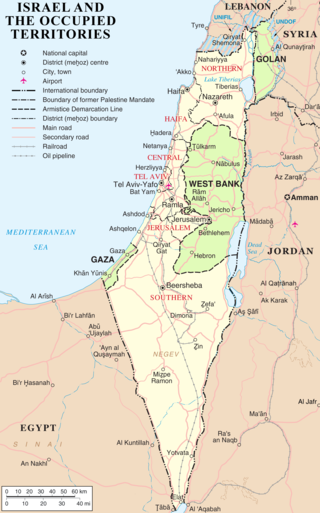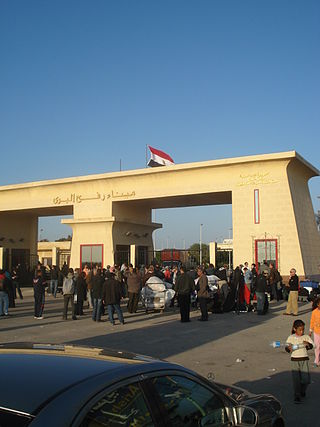
The Gaza Strip, or simply Gaza, is a polity and the smaller of the two Palestinian territories. On the eastern coast of the Mediterranean Sea, Gaza is bordered by Egypt on the southwest and Israel on the east and north.

Israeli settlements, also called Israeli colonies, are the civilian communities built by Israel throughout the Israeli-occupied territories. They are populated by Israeli citizens, almost exclusively of Jewish identity or ethnicity, and were built on lands occupied by Israel since the Six-Day War in 1967. The international community considers Israeli settlements to be illegal under international law, but Israel disputes this. The expansion of settlements often involves the confiscation of Palestinian land and resources, leading to displacement of Palestinian communities and creating a source of tension and conflict. Settlements are often protected by the Israeli military and are frequently flashpoints for violence against Palestinians. Further, the presence of settlements and Jewish-only bypass roads creates a fragmented Palestinian territory, seriously hindering economic development and freedom of movement for Palestinians.

The West Bank, so called due to its location relative to the Jordan River, is the larger of the two Palestinian territories. A landlocked territory near the coast of the Mediterranean Sea in the Levant region of West Asia, it is bordered by Jordan and the Dead Sea to the east and by Israel to the south, west, and north. The territory has been under Israeli occupation since 1967.

The Israeli–Palestinian conflict is an ongoing military and political conflict about land and self-determination within the territory of the former Mandatory Palestine. Key aspects of the conflict include the Israeli occupation of the West Bank and Gaza Strip, the status of Jerusalem, Israeli settlements, borders, security, water rights, the permit regime, Palestinian freedom of movement, and the Palestinian right of return.

The Palestinian territories are the two regions of the former British Mandate for Palestine that have been occupied by Israel since the Six-Day War of 1967, namely the West Bank and the Gaza Strip. The International Court of Justice (ICJ) has referred to the West Bank, including East Jerusalem, as "the Occupied Palestinian Territory", and this term was used as the legal definition by the ICJ in its advisory opinion of July 2004. The term occupied Palestinian territory was used by the United Nations and other international organizations between October 1999 and December 2012 to refer to areas controlled by the Palestinian National Authority, but from 2012, when Palestine was admitted as one of its non-member observer states, the United Nations started using exclusively the name State of Palestine. The European Union (EU) also uses the term "occupied Palestinian territory". The government of Israel and its supporters use the label "disputed territories" instead.

In 2005, 21 Israeli settlements in the Gaza Strip and four Israeli settlements in the West Bank were unilaterally dismantled. Israeli settlers and army evacuated from inside the Gaza Strip, redeploying its military along the border.

Israel has occupied the Palestinian territories and the Golan Heights since the Six-Day War of 1967. It previously occupied the Sinai Peninsula and southern Lebanon as well. Prior to Israel's victory in the Six-Day War, occupation of the Palestinian territories was split between Egypt and Jordan, with the former having occupied the Gaza Strip and the latter having annexed the West Bank; the Sinai Peninsula and the Golan Heights were under the sovereignty of Egypt and Syria, respectively. The first conjoined usage of the terms "occupied" and "territories" with regard to Israel was in United Nations Security Council Resolution 242, which was drafted in the aftermath of the Six-Day War and called for: "the establishment of a just and lasting peace in the Middle East" to be achieved by "the application of both the following principles: ... Withdrawal of Israeli armed forces from territories occupied in the recent conflict ... Termination of all claims or states of belligerency and respect for and acknowledgment of the sovereignty, territorial integrity and political independence of every State in the area and their right to live in peace within secure and recognized boundaries free from threats or acts of force."
International aid has been provided to Palestinians since at least the 1948 Arab–Israeli War. The Palestinians view the aid as keeping the Israeli–Palestinian peace process going, while Israelis and other foreign policy authorities have raised concerns that it is used to fund terrorism and removes the imperative for Palestinians to negotiate a settlement of the Israeli–Palestinian conflict. As a provision of the Oslo Accords, international aid was to be provided to the Palestinians to ensure economic solvency for the Palestinian National Authority (PA). In 2004, it was reported that the PA, within the West Bank and Gaza Strip, receives one of the highest levels of aid in the world. In 2006, economic sanctions and other measures were taken by several countries against the PA, including suspension of international aid following Hamas' victory at the Palestinian Legislative Council election. Aid to the PA resumed in 2008 following the Annapolis Conference, where Hamas was not invited. Aid has been provided to the Palestinian Authority, Palestinian non-governmental organizations (PNGOs) as well as Palestinian political factions by various foreign governments, international organizations, international non-governmental organizations (INGOs), and charities, besides other sources.
International human rights organizations, along with the United Nations, and the United States Department of State, have reported human rights violations committed by the State of Israel, particularly against minority groups. These reports include violations of the rights of Palestinians, both inside and outside Israel as well as other groups in Israel.

The Rafah Border Crossing or Rafah Crossing Point is the sole crossing point between Egypt and Palestine's Gaza Strip. It is located on the Egypt–Palestine border. Under a 2007 agreement between Egypt and Israel, Egypt controls the crossing but imports through the Rafah crossing require Israeli approval.

The Erez Crossing, also known as the Beit Hanoun Crossing, is a border crossing between the Gaza Strip and Israel. It is located at the northern end of the Gaza Strip, between the Israeli kibbutz of Erez and the Palestinian town of Beit Hanoun.

A blockade has been imposed on the movement of goods and people in and out of the Gaza Strip since Hamas's takeover in 2007, led by Israel and supported by Egypt. The blockade's current stated aim is to prevent the smuggling of weapons into Gaza; previously stated motivations have included exerting economic pressure on Hamas. Human rights groups have called the blockade illegal and a form of collective punishment, as it restricts the flow of essential goods, contributes to economic hardship, and limits Gazans' freedom of movement. The blockade and its effects have led to the territory being called an "open-air prison".

Since 2001, Palestinian militants have launched tens of thousands of rocket and mortar attacks on Israel from the Gaza Strip as part of the continuing Israeli–Palestinian conflict. The attacks, widely condemned for targeting civilians, have been described as terrorism by the United Nations, the European Union, and Israeli officials, and are defined as war crimes by human rights groups Amnesty International and Human Rights Watch. The international community considers indiscriminate attacks on civilian targets to be illegal under international law. Palestinian militants say rocket attacks are a response to Israel's blockade of Gaza, but the Palestinian Authority has condemned them and says rocket attacks undermine peace.
The Protocol on Economic Relations, also called the Paris Protocol, was an agreement between Israel and the PLO, signed on 29 April 1994, and incorporated with minor amendments into the Oslo II Accord of September 1995.

Restrictions on the movement of Palestinians in the Israeli-occupied territories by Israel is an issue in the Israeli–Palestinian conflict. According to B'Tselem, following the 1967 war, the occupied territories were proclaimed closed military zones. In 1972, general exit orders were issued allowing residents of those territories to move freely between the West Bank, Israel and the Gaza Strip. Following the First Intifada by 1991, the general exit orders were revoked, and personal exit permits were required. According to B'Tselem, a measure of overall closure of the territories was enacted for the first time in 1993, and would result in total closures following rises in Palestinian political violence.

The Agreement on Movement and Access (AMA) was an agreement between Israel and the Palestinian Authority (PA) signed on 15 November 2005 aimed at improving Palestinian freedom of movement and economic activity within the Palestinian territories, and open the Rafah Crossing on the Gaza–Egypt border. AMA was described as: ″an agreement on facilitating the movement of people and goods within the Palestinian Territories and on opening an international crossing on the Gaza-Egypt border that will put the Palestinians in control of the entry and exit of people.″ Part of the agreement was the Agreed Principles for Rafah Crossing.
Gaza Seaport is a planned seaport in the Gaza Strip. The establishment of a Gaza seaport was mentioned in the Oslo I Accord, as early as 1993. The 1999 Sharm el-Sheikh Memorandum determined that the construction works could commence on 1 October 1999. The project started on 18 July 2000, but was stopped in an early stage due to obstruction of the supply of construction materials, and destruction by the Israeli army in September and October 2000 when the Second Intifada inflamed. The 2005 Agreement on Movement and Access, following Israel's withdrawal from Gaza, re-announced the start of the works. Israel promised to assure donors that it will not interfere with operation of the port. As of 2014, however, the construction has not been resumed.

The 2014 Gaza War, also known as Operation Protective Edge, and Battle of the Withered Grain, was a military operation launched by Israel on 8 July 2014 in the Gaza Strip, a Palestinian territory that has been governed by Hamas since 2007. Following the kidnapping and murder of three Israeli teenagers in the West Bank by Hamas-affiliated Palestinian militants, the Israel Defense Forces (IDF) initiated Operation Brother's Keeper, in which some 350 Palestinians, including nearly all of the active Hamas militants in the West Bank, were arrested. Hamas subsequently fired a greater number of rockets into Israel from the Gaza Strip, triggering a seven-week-long conflict between the two sides. It was one of the deadliest outbreaks of open conflict between Israel and the Palestinians in decades. The combination of Palestinian rocket attacks and Israeli airstrikes resulted in over two thousand deaths, the vast majority of which were Gazan Palestinians. This includes a total of six Israeli civilians who were killed as a result of the conflict.

The Israeli permit regime in the West Bank is the legal regime that requires Palestinians to obtain a number of separate permits from the Israeli military authorities governing Palestinians in the Israeli-occupied West Bank for a wide range of activities. The first military order requiring permits for the Palestinians was issued before the end of the 1967 Six-Day War. The two uprisings of 1987 and 2001 were met by increased security measures, differentiation of IDs into green and red, policies of village closures, curfews and more stringent restrictions on Palestinian movement, with the general exit permit of 1972 replaced by individual permits. The stated Israeli justification for this new permit regime regarding movements was to contain the expansion of the uprisings and protect both the IDF and Israeli civilians from military confrontations with armed Palestinians. The regime has since expanded to 101 different types of permits covering nearly every aspect of Palestinian life, governing movement in Israel and in Israeli settlements, transit between Gaza and the West Bank, movement in Jerusalem and the seam zone, and travel abroad via international borders. The Israeli High Court has rejected petitions against the permit regime, allowing that it severely impinges on the rights of Palestinian residents but that the harm was proportionate.














